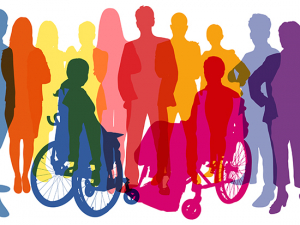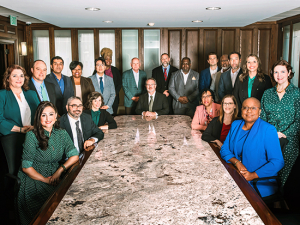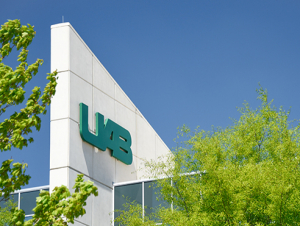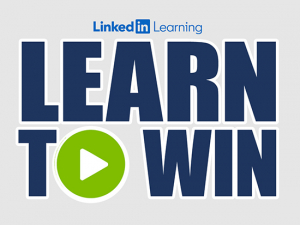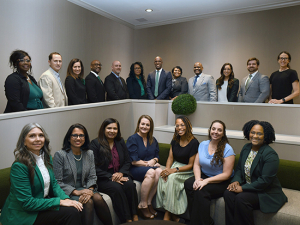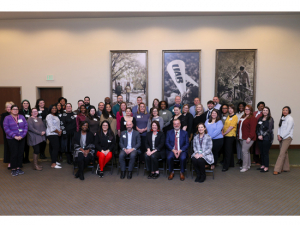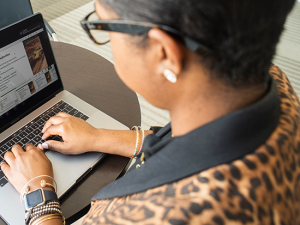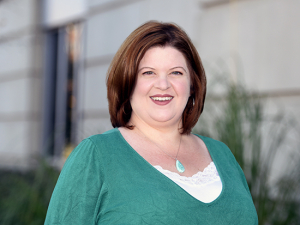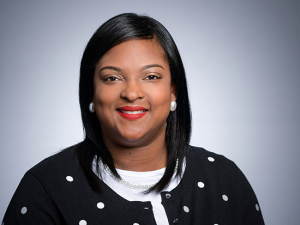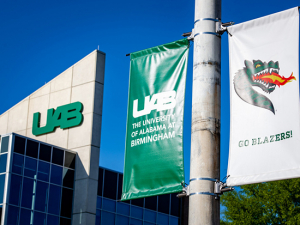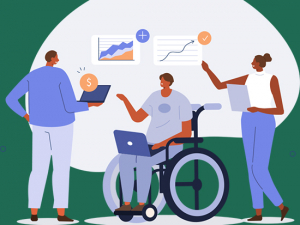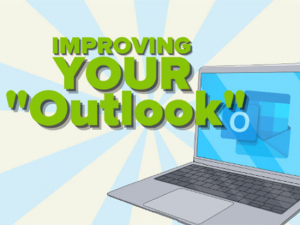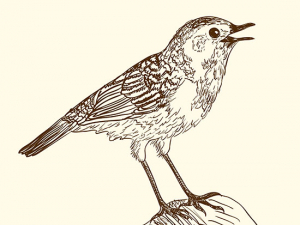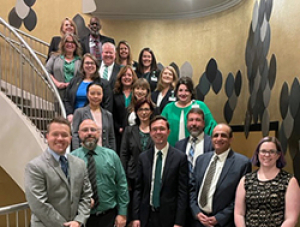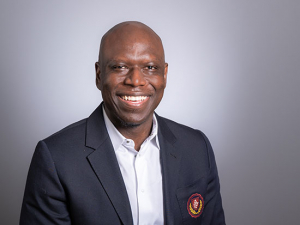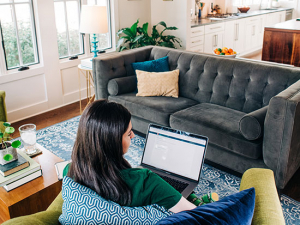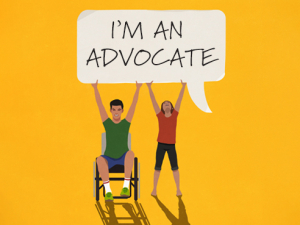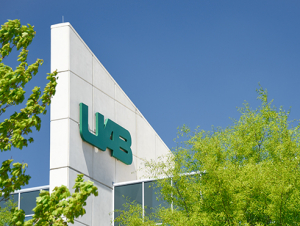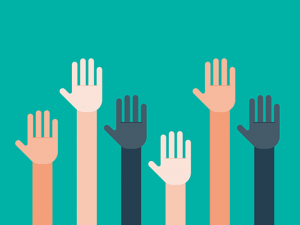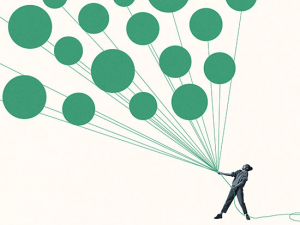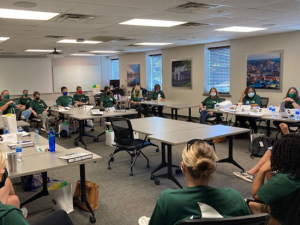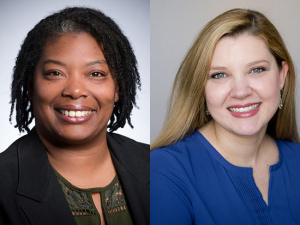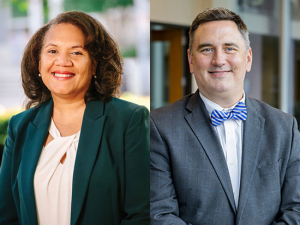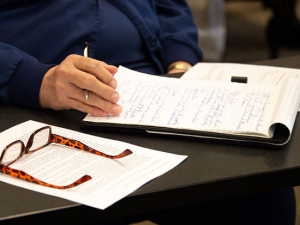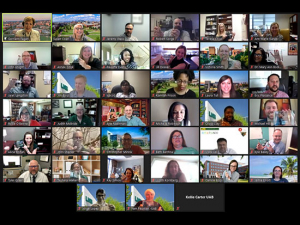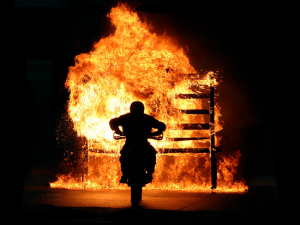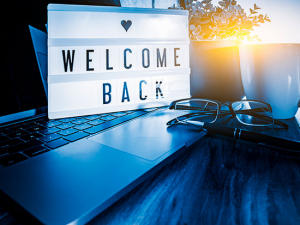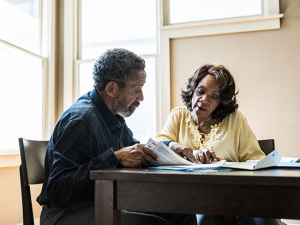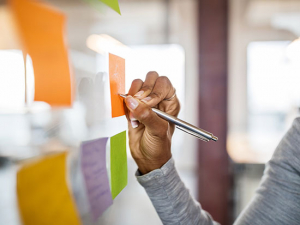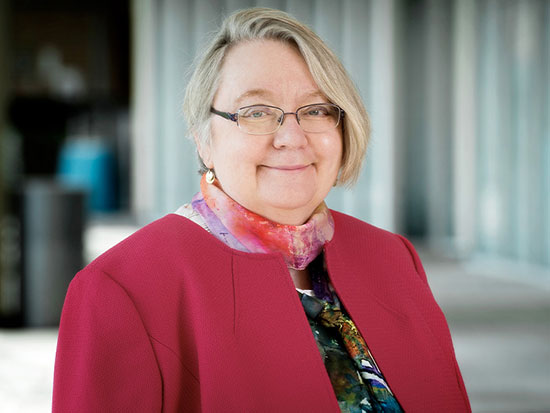 Provost Pam Benoit presented at the 29th and final Resilient Leader meeting of 2020. The popular series will return Feb. 2.The pandemic work experience can be both isolating and intensely intimate, all at once. During meetings, colleagues get a glimpse of each others’ pets, kids and interior decorating choices. And when else could you hear a leader of one of the state’s premier institutions share her status as a “professional listmaker,” the rules for the game she and her husband play on tough days and this confession: “I have cut my husband’s hair a couple of times, and he has offered to cut mine,” followed by a comic’s pause. Then, deadpan: “I said no.”
Provost Pam Benoit presented at the 29th and final Resilient Leader meeting of 2020. The popular series will return Feb. 2.The pandemic work experience can be both isolating and intensely intimate, all at once. During meetings, colleagues get a glimpse of each others’ pets, kids and interior decorating choices. And when else could you hear a leader of one of the state’s premier institutions share her status as a “professional listmaker,” the rules for the game she and her husband play on tough days and this confession: “I have cut my husband’s hair a couple of times, and he has offered to cut mine,” followed by a comic’s pause. Then, deadpan: “I said no.”
But this isn’t the funniest line of the day from Provost Pam Benoit, who closed out the 29th and final meeting in 2020 for Organizational Learning and Development’s Resilient Leader series Dec. 1. To catch that story, though, you had to be there. When Learning and Development organized the series in the wake of UAB’s transition to a limited business model in the spring, the goal was “to create a forum for keeping UAB leaders connected,” said Organizational Development Manager Gerriann Fagan. “Organizational Learning and Development can’t provide PPE, but we can provide leaders with role models, stories, tools and community to help build resilience to carry them through.” Part of the communal experience is that the sessions weren’t being recorded, to encourage more openness and raw discussion among participants. (Due to popular request built by word-of-mouth reports about the value of the sessions, the no-recording policy may change when Resilient Leader returns in 2021.)
'We're all surviving this together'
By all accounts, the series has been powerful, helping employees see how their co-workers have navigated both the pandemic and the career paths leading them into their current roles. “We’re all surviving this together,” Benoit noted at the beginning of her presentation. Speakers throughout the course of the Resilient Leader program illustrated this beautifully, the regular attenders say.
| The first Resilient Leader presentation of the new year is scheduled Feb. 2. Check the Learning & Development site for time and Zoom link as they become available and discover other programs and learning opportunities at uab.edu/learndev. |
“Presenters from all across campus discussed ways they stepped up to do their part to move UAB forward during the pandemic,” said UAB Benevolent Fund Manager Lisa Higginbotham, “from eLearning helping move classes to a virtual format to School of Engineering creating much-needed face shields to the Employee Assistance and Counseling Center providing advice for self-care. A key takeaway from the Resilient Leader series is the incredible talent of staff and faculty who are dedicated to UAB’s mission.”
“We got to share a common experience — learning about UAB and each other and leadership,” Fagan said. The presenters “were all real and vulnerable, sharing their challenges and struggles.” Among the most moving, she said, was an April presentation by Faye Williams, senior director of nursing services at UAB Hospital, and two of her nurse colleagues. “They were supporting the COVID floors and shared their stories.”
'When leaders can be vulnerable'
“We already know we have amazingly accomplished leaders on our campus who do heroic things,” said Angela Stowe, Ph.D., director of Student Counseling Services. “However, where I learn the most is by hearing how they used resilience in their own lives and careers to pull them out of failures, setbacks and difficult times. This is very powerful when leaders can be vulnerable and share these experiences — there is so much to learn.”
“I personally was able to come away with something very applicable from each session,” said Anthony Caminiti, director of operations for UAB Facilities. He was particularly inspired by the presentation by Dan Carlson, senior associate athletic director for administration with UAB Athletics. “He was quite inspiring in his message and attitude,” Caminiti said. “His life story very much embodies the concept of being resilient.”
Higginbotham was similarly inspired by the presentation from Paulette Patterson Dilworth, Ph.D., vice president for Diversity, Equity and Inclusion. “She shared her story and thoughts about leadership, resilience, diversity and inclusion,” Higginbotham said. “We talked about both the COVID–19 pandemic and the racism pandemic. The discussion was insightful and thought-provoking. A number of the attendees, including me, decided to continue the discussion through a Talk Matters book club,” which focused on Beverly Tatum’s bestseller, “Why Are all the Black Kids Sitting Together in the Cafeteria?” “The book discussion challenged me both personally and professionally to take an active role in being antiracist,” Higginbotham said. “The Resilient Leader program is designed for its participants to take it in whatever direction is desired and affinity groups like the one I participated in can develop.”
A feeling of community
Many participants mentioned the feeling of community among regular attenders. Attendance averaged around 50 across the series, culminating in more than 80 attendees for Benoit’s session. That breadth and depth of campus representation made the experience all the richer, participants say.
| “Our leadership competencies are bucketed into Understand UAB, Achieve Results and Build Relationships. This program allowed leaders to do all three. We can’t thank the guest presenters enough. By sharing stories and their experiences, they helped inspire others.” — Organizational Development Manager Gerriann Fagan |
“I love seeing the faces of people all across campus together in an experience focusing on being resilient leaders,” Stowe said. “This creates a real sense of being in this together, all wanting to strive to support our teams and our campus and lead in the strongest way possible. I think it also reflects our shared humanity in that we are all also needing support in building our own resiliency — that we all struggle and have challenges and need each other and the support of our institution.”
“To see others with a similar passion to develop their leadership skills is both inspiring and motivating to me,” added Caminiti. “I truly enjoy being around like-minded people, and this also gives us an opportunity to continue to share best practices in an open and respectful environment.”
Four strategies for looking forward
Benoit shared her own practices during her presentation. “Keep looking ahead,” she encouraged. “That helps to build our resiliency.” She noted that four strategies have been particularly useful to her at this time:
1) Focus on the positive, both present and prospective. “We play a game in my house called ‘Say three good things,’” Benoit said. “My husband and I have to say three things that happened that day that were good and on a particularly bad day they may be small things and it may take a while, but we keep at it.”
2) Celebrate wins, big and small. “I am a professional listmaker; I make lists for pretty much everything,” Benoit said. “The nice thing about that is that it allows me to celebrate wins, even if they are small. Some days my list gets completely hijacked. So what I will do is put things on there like, ‘Eat lunch,’ so I have something I can cross off the list. That was something I needed to do and I got that done, even if I didn’t get anything else on my list done that day.”
3) Build and maintain relationships. “It’s difficult to keep a team together and build relationships remotely, but it can be done,” Benoit said. “I’ve seen some really interesting examples here at UAB. The School of Health Professions over Thanksgiving did a cookbook and shared it out with all their faculty and staff. In the Graduate School they have done a gardening webinar and a cooking webinar.” Professional relationships are important, Benoit said, but so are personal connections. “My family gets together every Sunday afternoon at 1 p.m. for family games. We have this standing meeting where we all get together.” And when her team gathers, Benoit said, they begin every meeting with an icebreaker question to reinforce the human element, even in the professional setting. “Today’s was ‘What’s one thing we don’t know about you that you are willing to share?’” she said. “Just small things, like ‘Do you like coffee or tea?’ or ‘What are your favorite movies?’ I’ve learned a lot more about my team this way than I would have otherwise, no matter how much we interacted in the office.”
4) Laugh. Benoit shared one of her favorite shows to put herself in a good mood. “I also laugh at myself,” she said, then launched into a very funny story about a mowing crew, an important phone call and a trip… You had to be there.
“For me, having an hour to step back, reflect, learn and focus on resiliency in my leadership was extremely meaningful and beneficial,” Stowe said. “My day-to-day schedule doesn’t generally allow for time to step back for intentional reflection on leadership because we are responding to the demands of the moment, putting out fires, planning for the uncertainty and supporting our team who is doing such heavy lifting to help others. But I know that taking time to step back and look at my leadership strategy, and make sure I am building and supporting my own resilience, is absolutely important to my team. If I’m not healthy and resilient, how can I support my team or provide that support to our students and our campus?”
